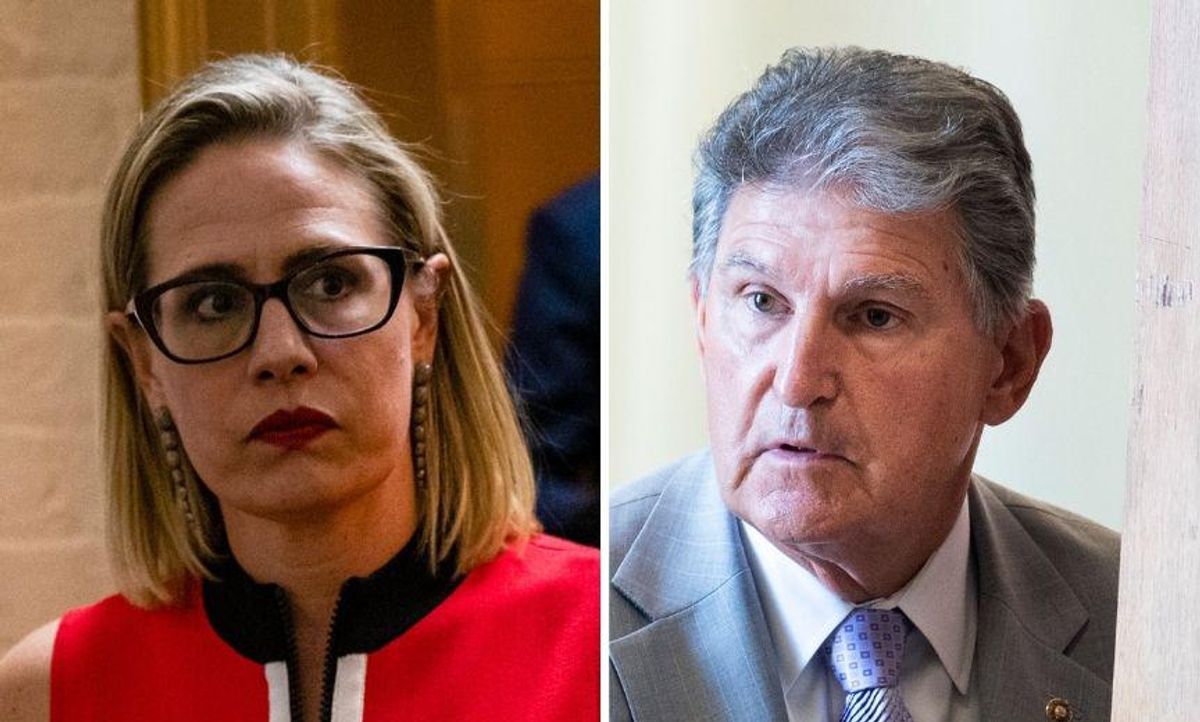It's been a month of punishing bad news. From harrowing images of Afghans desperate to board U.S. evacuation planes, to frightening new highs in Covid cases and hospitalizations among unvaccinated Americans, to GOP voter suppression bills passing without action from the Senate, to the Supreme Court eviscerating Roe v. Wade in an unsigned, shadow docket order—the non-stop negative developments and headlines have ended the Biden White House's honeymoon with voters. Politically speaking at least, Democrats are very much in need of a win.
That win was supposed to come this month in the form of a pair of hard-fought bills: one bipartisan infrastructure bill for roads, bridges and broadband and a second reconciliation budget bill to fund long-dreamed of Democratic priorities including expanding Medicare, ending childhood poverty, and addressing climate change.
But yesterday, in his signature "release a damaging op-ed instead of picking up the phone" style, Senator Joe Manchin fired a shot across the Biden agenda, asking for a "pause" on the reconciliation bill so that he could understand whether it really ought to carry a $3.5 trillion price tag. "Instead of rushing to spend trillions on new government programs and additional stimulus funding, Congress should hit a strategic pause on the budget-reconciliation legislation," Manchin wrote and no doubt pointedly placed in the Wall Street Journal. "A pause is warranted because it will provide more clarity on the trajectory of the pandemic, and it will allow us to determine whether inflation is transitory or not."
Most experts believe inflation isn't being driven by stimulus so much as supply chain disruptions from the pandemic, but that didn't stop Manchin from using GOP talking points to stake out his position. Added to Senator Kyrsten Sinema's earlier statement that she would not support a bill as large as $3.5 trillion, this leaves the White House and Congressional Democratic leaders in a bit of a bind.
It also quickly infuriated House Democrats. Responding via social media, Progressive House Caucus leader Pramila Jayapal responded to Manchin swiftly. "Pause on finally delivering child care, paid leave, education, health care, affordable housing, climate action, and dental, vision, and hearing to millions of families across America? Absolutely not." Rep. Alexandria Ocasio-Cortez, a political ally of Sen. Bernie Sanders who is leading the progressive charge in the Senate, called out Manchin for trying to seem moderate while actually catering to corporate lobbyists, tweeting, "Manchin has weekly huddles w/ Exxon & is one of many senators who gives lobbyists their pen to write so-called 'bipartisan' fossil fuel bills. It's killing people. Our people. At least 12 last night. Sick of this 'bipartisan' corruption that masquerades as clear-eyed moderation."
Sen. Sanders made his position clear without naming Manchin. "Rebuilding our crumbling physical infrastructure – roads, bridges, water systems – is important. Rebuilding our crumbling human infrastructure – health care, education, climate change – is more important. No infrastructure bill without the $3.5 trillion reconciliation bill," he stated.
As House and Senate committees work on the massive reconciliation bill in the hopes of completing it by September 15, its ultimate fate now remains uncertain. If Senators Manchin and Sinema dig in, House Progressives could refuse to support the moderates' darling bipartisan infrastructure bill. Indeed, Speaker Pelosi has promised not to act on that bill until the Senate passes the reconciliation bill. But now she is more constrained, having promised moderates within the House that the vote on reconciliation would take place no later than September 27.
There may be a narrow path forward, however. Manchin has not provided any specifics about where he would like to see the price tag cut. It might be possible to stretch the spending longer than the current ten years, for example, which might give more time for new tax revenues to cover its costs. There might be portions of the bill that the Senate Parliamentarian overrules as improper under the budget rules for reconciliation, such as an ambitious amnesty plan for undocumented immigrants that is currently in the mix.
Further, if future inflation numbers come in lower than expected, as some experts believe may happen, this could also take some of the wind out of Manchin's argument, and he would have a graceful way out saying the problem resolved itself. But whether the bill's cost ultimately is $3.5 trillion or $2.9 trillion or even lower appears to matter a lot less than the optics of whether Manchin and Sinema can claim they exacted concessions from progressives and the White House. Negotiators are going to have to find a way to placate both wings in order to steer the bills into harbor.
The in-fighting among Democrats has pleased GOP Senate Minority Leader Mitch McConnell, who has praised Manchin and Sinema for their stances and has even publicly prayed for their good health. McConnell's smug satisfaction could be short-lived, however, just as it was after both senators ultimately came on board to support the American Relief Plan without a single GOP vote in favor.
Whether such a narrow win on the twin bills will happen again remains very unclear for now. But after last month, Democrats do need these wins—and badly.
 SECONDNEXUS
SECONDNEXUS percolately
percolately georgetakei
georgetakei comicsands
comicsands George's Reads
George's Reads








